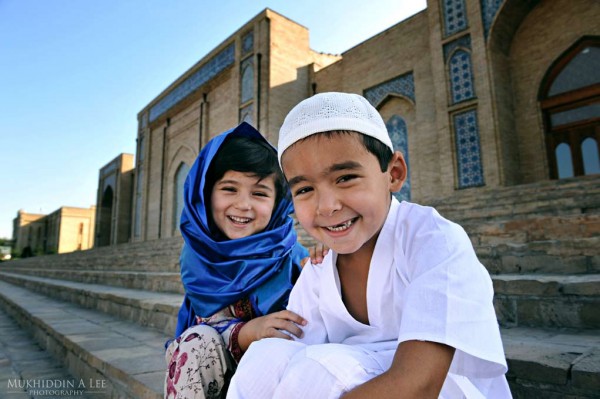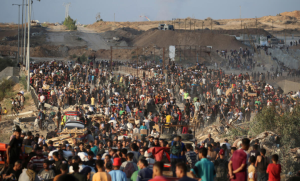children-2-600x399-300x200.jpg" alt="(Foto: Muslim Village)" width="300" height="200" /> (Foto: Muslim Village)
Source: IslamWeb.net
The practice and spirit of fasting should be engrained in children so that it comes natural and effortless for them as they reach adulthood.
The month of Ramadan is a time of excitement, socializing, and devotion. As we take care of the spiritual and social part of ourselves during this special month, it is important to remember to also focus some time on our children.
They should not merely be on the sidelines, watching as all the events pass by – they should instead be active and central players in all that occurs, and take advantage of this blessed time.
Just as it is an obligation for Muslim parents to teach their children how to perform prayers, it is also expected of them to train their children regarding the importance, rules and etiquette of fasting. This is part of the overall education that children must gain from an early age.
Also Read: Imaam Yakhsyallah: Nurture Love for the Prophet, One Will Be with Whom One Loves
Fasting is one of the main pillars of Islam, and it is, therefore, a foundation for all other knowledge. For this reason, the practice and spirit of fasting should be engrained in children so that it comes natural and effortless for them as they reach adulthood.
Rather than presenting a list of suggestions, it may be useful to preview two very different scenarios of children during Ramadan. As you read through them, think about which scenario you would prefer for your child, and also for yourself.
Mustafa is an 11-year old Muslim boy who loves to play as any child does. During Ramadan, he enjoys the time that he has to socialize with cousins, friends, and neighbors. He especially likes the fact that he can stay awake longer than usual to enjoy the guests and food. He cannot wait for the Eid celebration because of the many gifts and the wonderful fun that he will have. Unfortunately, Mustafa has no really gotten into the “fasting thing”, he calls it. He feels that it is too difficult for him and that it will affect his studies.
Many of his friends do not fast; so’ he does not think that it is necessary for him to do so either. There are even adult members of his household who do not fast. His uncle is the only family member who goes to the Masjid for Taraaweeh, but Mustafa refuses to go with him because he says that it is too crowded. His parents have never encouraged him to fast or participate in this special prayer. They have not wanted to make it a hardship for their children. They do some reading of Quran, but it is not an integral part of the day. They focus on the “fun” aspects of Ramadan rather than the spiritual.
Also Read: Thanksgiving: An Islamic Perspective
As Mustafa reaches puberty, chances are that he will not fast during Ramadan as is required in the Islamic faith. He will miss out on that special opportunity to build a strong relationship with Allah, his Creator. The beauty and peacefulness of Ramadan can never be surpassed, not even by the “fun” that Mustafa is enjoying so much. The even sadder news is that this puts both Mustafa and his parents in a very precarious position because Allah will judge them for the choices they have made.
Ahmad is just as excited about Ramadan as Mustafa, but for different reasons. Of course, he enjoys the fun and festivities of the month, but the spiritual aspect is much more important to him. Ahmed has been fasting since he was 5years old. He began with half days and by the age of 7 he was fating full days. He is 12 years old now and continues to fast the complete month. He also attends the Masjid each evening with his father for the Taraaweeh prayers.
After completing Taraaweeh, he spends some time with his friends at the Masjid. He is excited about the Quran competition that the Masjid is conducting this year and has been busily studying Chapter Ya-Seen for the contest. His dream is to win the first prize so that his mother and father will feel proud of him.
Ahmad does not find the fasting or the performing of praeyrs during Ramadan to be challenging. His parents have taught him from a very young age about the importance of prayer and fasting, and they have always been good role models for him.
Also Read: Achieving the Position of Fasting Expert with Kindness of Morality
More importantly, they have taught him about his duty to Allah, his Creator and the rewards that await those who fulfill this duty. Ahmad loves Allah and has a strong desire to be near to Him. The month of fasting offers him a special opportunity to strengthen this bond.
The sweetness of faith that he experiences during this time is something that he looks forward to the whole year round. It is very likely that Ahmad will continue his faith and practice into adulthood and, ‘Insha Allah’ will receive his due rewards from Allah in the Hereafter. His parents have the pleasure of seeing their son grow into an obedient servant of Allah and, ‘Insha Allah’ will also get Allah’s rewards.
After reading these two very different scenarios, which one did you aspire for your own child?
It is important to remember that the path to Paradise may be difficult, but the end of this path is filled with unimaginable treasures. Allah will guide us on that path and make it easy for us. As parents, it is an obligation for us to show our children the direction of that path; and the blessed month of Ramadan is a special and unique time to do just that. We need to be good role models for our children and encourage them to fulfill their responsibilities toward Allah.
Also Read: The Power of Charity in Ramadan
We need to praise them for their successes and remind them of Allah’s pleasure. We need to emphasize that remembrance and fear of Allah are more wondrous than anything on this earth.
Ramadan is a gift from Allah that allows us to do all of that, and therefore we must take advantage of this blessed opportunity. Doing so will teach our children as Ahmad’s parents have the importance of humbleness, obligation and working toward our ultimate goal, Paradise.
If we fail to teach our children these invaluable lessons by our own actions and instructions, then what message of importance are we passing on to them? (T/Imt/R04)
Mi’raj Islamic News Agency (MINA)
Also Read: Ramadan Brings the Change










![Israeli tanks and APC’s gather by the Israeli – Lebanese border. Amid Israel’s escalating campaign against Hezbollah in Lebanon on September 30, 2024. [Erik Marmor/Getty Images]](https://en.minanews.net/wp-content/uploads/2024/10/IMG_20241001_203226-300x197.jpg)





















 Mina Indonesia
Mina Indonesia Mina Arabic
Mina Arabic